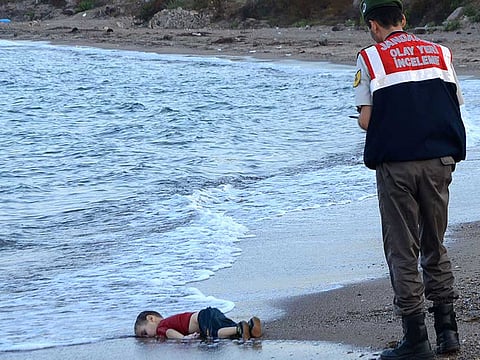A year on from Aylan Kurdi, Britain still has a moral case to help child refugees
In Britain’s remaining time in the European Union, it should push for Europe-wide action on child safeguarding

Twelve months ago, the limp body of a Syrian child on a Turkish beach shook the conscience of the world. Since Aylan Kurdi drowned last year, 400 children, whose names we will probably never know, have lost their lives in the Mediterranean Sea. Ten thousand child refugees have disappeared in Europe, while millions of children have been forced from their homes.
Some in the British government seem to be hoping that a year on, campaigners will give up. That the pressure to act triggered by a child’s photo has gone and Britain will conclude that it is too hard to make a difference or maintain public support.
But people just won’t. The lesson of the last year should be that however difficult things look, we can still save lives and children’s futures. But one has to keep the pressure up — especially on the British government.
The moral case for action is stronger than ever. The disturbing image last month of five-year-old Omran Daqneesh, dazed, dusty and bloodied on a plastic ambulance seat, was a searing reminder of what people are fleeing. All countries have a responsibility not just to help those fleeing persecution, but to protect children from suffering.
British Home Secretary Amber Rudd must speed up the system so that at least 500 child refugees can be in the United Kingdom before Christmas.
Britain’s security interest in tackling the refugee crisis remains as powerful too. Criminal trafficking gangs are getting stronger, extremists are able to exploit the crisis and the disorder of an unmanaged response threatens community cohesion and stability.
Those in Britain must not be deterred from building support for child refugees by far-right campaigns. Most people — including most Leave campaigners — were appalled by Nigel Farage’s vile posters during the referendum campaign. And Britons built huge cross-party support (against expectations) for the Dubs amendment to help child refugees this summer.
Far from being impotent, there are practical things that governments could be doing right now to help child refugees. British Prime Minister Theresa May and Rudd should go to the global summit on refugees led by United States President Barack Obama later this month to try to reach new commitments on aid and resettlement, as well as resolving conflicts that are forcing people from their homes. Britain must be part of new international partnerships and action, rather than using the Brexit vote as an excuse to turn inwards. The United Kingdom should continue its leading role on aid, not cut back under the new International Development Secretary Priti Patel.
In Britain’s remaining time in the European Union, it should push for Europe-wide action on child-safeguarding and the restoration of border checks within the Schengen zone to stop child trafficking and increase security. And it is time to end the scandal of the Calais camp where violence is increasing and more than 600 unaccompanied children are at daily risk from trafficking and sexual abuse. Britain needs a proper plan with France, like the one Britain negotiated to close Sangatte many years ago — including United Nations High Commissioner for Refugees’ assessments, support for refugees and returning illegal migrants home.
Rudd must take urgent action to sort out the failing and secretive British programme for child refugees that she has inherited from May. It is clear that the Dublin system to reunite children who have families in the UK isn’t working. The Dubs amendment to help lone child refugees in Europe isn’t being implemented. The Middle East and north African programme announced in January to help 3,000 children at risk still isn’t in place. Even the programme for Syrian families announced by former British prime minister David Cameron last October has stalled. Councils stand ready to help, but just over a tenth of the promised 20,000 refugees have arrived in Britain.
Last week, in Calais, I met a Syrian teenager who was given Home Office approval two months ago to join family in Britain, but hadn’t still been given his paperwork to travel, leaving him alone, scared and tired in a gang-ridden camp. After a cross-party visit and coverage in the Guardian, the British Home Office finally gave him a date to rejoin his family — in a further fortnight. This kind of delay puts children’s safety and lives at risk.
Rudd must pledge to work with the French to ensure no child spends another winter in the horrors of the Calais camp.
A year ago, last week, I made a speech calling for action to help refugees, just a few days before the picture of Aylan Kurdi appeared. I said then that future generations will judge Britain on its response. Now, Britain must not let its government’s foot-dragging leave children at risk and put all Britons to shame.
— Guardian News & Media Ltd
Yvette Cooper is shadow home secretary and the former work and pensions secretary. She is an MP for Pontefract and Castleford.



